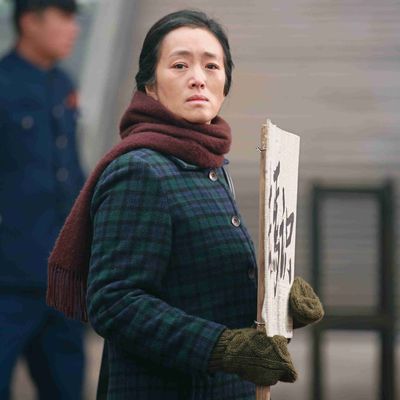
Once upon a time, the filmmaker Zhang Yimou and his then-muse Gong Li collaborated on some of the most momentous works of new Chinese cinema. The films they made were diverse. They included lush, ruthless period dramas like┬áJu Dou┬áand┬áRaise the Red Lantern,┬áas well as a neo-neorealist tale of bureaucracy gone haywire,┬áThe Story of Qiu Ju. Though ostensibly apolitical, these films nevertheless painted vivid portraits of a society where the status quo ÔÇö whether it consisted of the traditionalist mores of the past, or the state machinery of the present ÔÇö was forever stifling. (Their masterful 1994 collaboration┬áTo Live┬áactually got Zhang banned from filmmaking for two years by ChinaÔÇÖs state censors.) The pair ÔÇö also romantically linked for a while ÔÇö eventually went their separate ways, though both continued to grow in stature. Zhang became a state-approved filmmaker of (admittedly still pretty great) historical epics like┬áHero┬áand┬áThe House of Flying Daggers, and he also directed the eye-popping and massive opening and closing ceremonies of the 2008 Beijing Olympics.
I give all this background to help explain my excitement at the idea of these two working together again. Nobody shoots Gong like Zhang does: HeÔÇÖs attuned to her every wince and whimper, her every glance and gesture. While they did reunite about a decade ago, for 2006ÔÇÖs ornate melodrama The Curse of the Golden Flower, thereÔÇÖs something about seeing them paired once more in a social drama, one with a political kick, no less. Coming Home, based on the novel The Criminal Lu Yanshi, opens at the height of ChinaÔÇÖs Cultural Revolution, with every aspect of life under the sway of an activist party highly sensitive to anything it deems politically incorrect. Feng Wanyu (Gong) lives with her teenage daughter, Dandan (Zhang Huiwen), while her husband, Lu Yanshi (Chen Daoming), is off in prison for an unstated political offense. (One official refers to him as a ÔÇ£sneaky rightist.ÔÇØ) As the film opens, Lu has escaped from prison, and the headstrong Feng seems secretly eager for his return. Dandan, however, hasnÔÇÖt seen her father since she was 3 and is terrified that his escape could jeopardize her attempts to become a dancer; sheÔÇÖs trying for the lead in the notorious political ballet The Red Detachment of Women. The family is watched by the authorities, but itÔÇÖs Dandan herself who betrays her father. As Lu waits for his wife by the train station, heÔÇÖs grabbed by the police; Feng herself, though she witnesses this from afar, is injured in the ensuing scuffle.
All that, however, is mostly prologue. The film then jumps ahead a few years: The Cultural Revolution is over, and Lu has now been granted a release from prison. Dandan, who works at a textile factory, never got the lead in the ballet; her fatherÔÇÖs political activities did indeed prevent her. Feng, meanwhile, suffers from an odd form of dementia ÔÇö one that might have been caused by a head injury, or emotional trauma, or something else. When Lu, the great love of her life, shows up at the door, she has no idea who he is. But she knows who he is as a concept┬áÔÇö she understands that she has a husband in prison and that heÔÇÖs been freed, and sheÔÇÖs even excited for his return. But whenever Lu (or anyone else) tries to explain to her that he is indeed that person, she either doesnÔÇÖt recognize him or thinks heÔÇÖs Mr. Fang ÔÇö an official who may have once taken advantage of her.
HereÔÇÖs a highly theatrical conceit, the kind of very movie-friendly illness usually reserved for potboilers. But Zhang takes it at face value and treats it seriously. That could be disastrous, and Coming Home is not without its awkward parts: The filmÔÇÖs different movements donÔÇÖt always fit as well as we might expect, which is surprising, given that Zhang is nothing if not a master of tone.
But thereÔÇÖs a fascinating idea here. More than anything, Coming Home is a film about watching. Early on, the authorities watch Dandan to see if she might know her fatherÔÇÖs whereabouts. After his escape, before he makes contact, Lu watches his family from afar. Feng witnesses LuÔÇÖs seizure when he attempts to return to her the first time. Later, Lu, in an effort to get Feng to remember who he is, stages and restages his arrival at the station, watching her watch him for any signs of recognition. Later, Dandan secretly looks on as her parents enact and reenact this tragic charade. One could even say that the story is defined by the way the idea of looking changes across time. A society where people spied on each other for the momentary demands of politics transforms into one where they spy on each other for the more powerful demands of the human heart. Furthermore, one can sense a metaphor here for what Zhang himself has been doing with his films: restaging the past to influence the present, creating new memories to take the place of older, more painful ones.
But Coming Home works best on a more lived-in, emotional level. It presents a trajectory not uncommon in ZhangÔÇÖs films: a journey from howling passion to somber, almost tragic acceptance. As a director, he loves to play with melodrama, but he loves even more to smother it, to quash his lovers and see if their spirit endures. And nestled within Coming Home is another metaphor, one not about politics or cinema but about love and acceptance ÔÇö about the things we expect from relationships, and the things in which we ultimately find a kind of muted happiness. As Lu and Feng struggle to reconnect, and find themselves settling for the oddest of dependencies, itÔÇÖs hard to be unmoved.


